Simple steps to your
Zero Waste Lifestyle
Zero Waste is simply about reducing the waste we produce, reusing and recycling what we can and composting the organic waste. This makes our economy circular and creates a more sustainable lifestyle following the example of nature. The circular economy is all about maximising the value of products and services by designing them to last and not to become waste, contrary to the current linear economy which is to ‘make, use, dispose’.

A more sustainable lifestyle following the example of nature.
KNOW YOUR WASTE
Did you ever wonder what amount of waste you produce every year? What is your waste made of? And where it goes? It mostly ends up in landfills or nature, pollutes our land, water and air and finds its way to our food chain. It is time to take action today! Keep reading to find out how!
SMALL ACTIONS DO MATTER
Small actions really do matter!
We know we can’t do everything, but if we all do what we can, people around us will start following our example. Together we can create a wave of change and make a huge difference.
Okay, where do I start then?
It’s simple, just follow the Zero Waste Hierarchy below and choose what is possible for you to do starting today.
It will show you per order of importance small actions to decrease your waste.
5 Rs
Zero Waste Lifestyle Hierarchy
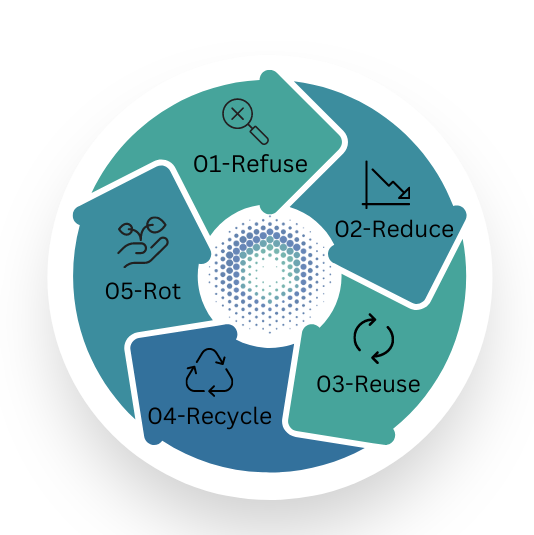
01 - RETHINK & REFUSE
Stop and think twice! Rethink and refuse to purchase what you don’t really need.
02 - REDUCE
03- REUSE
04 - RECYCLE
Recycling is not a magic wand. The best is always to avoid producing waste and recycle only what you just couldn’t avoid!
05 - ROT
Copyright @ 
01
Rethink & Refuse
The consumerist society encourages people to buy, use and dispose of things quickly. This leads to the uncontrolled creation of massive amounts of waste and pollution. The best advice is: Stop and think twice! Rethink and refuse to purchase what you don’t really need or products that just don’t last or are unnecessarily wrapped in single-use plastics. Choose products that are sustainably and locally made over imported mass-produced goods. Here are some examples of items creating unnecessary waste that you can easily stop using and where to find alternatives in Montenegro:
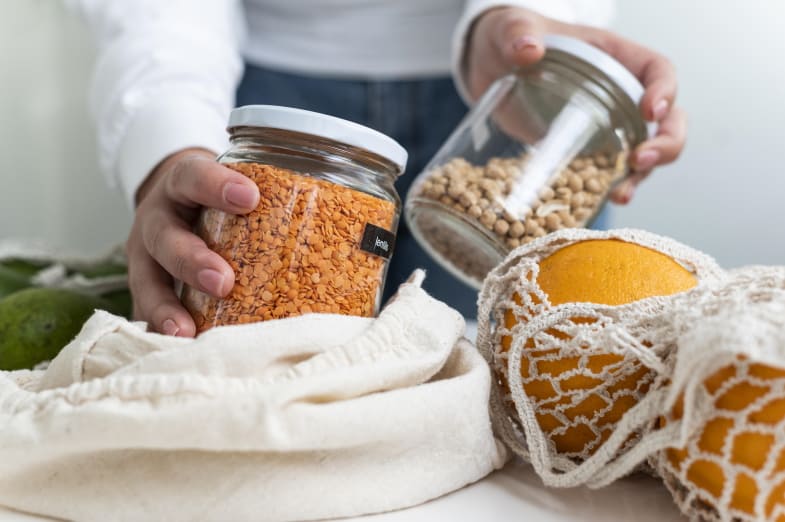
Single-use bags. A single-use plastic bag can take 1,000 years to degrade. There is a selection of beautiful and practical reusable bags on the market (in bookstores, home stores) Always have one with you and if you forget to take it, you can always ask for a cardboard box at the cashier’s to pack up your groceries. Be aware that so-called bio and oxo degradable bags are still single-use and do not decompose in home composts or nature.
Thin plastic bags for fruits and vegetables. When plastic comes into contact with food, it can leach harmful compounds into it, so instead of having your veggies wrapped up in plastic ask for the sticker to be put directly on the fruit, or ask for a paper bag. You can also bring your own bags when you go grocery shopping. We found them at Grasshopper but you can also make them yourself.
Plastic bottles. Did you know that on Clean up Montenegro actions plastic bottles are the most commonly found type of waste? It’s simple – use a reusable water bottle. Tap water is fine to drink and reusable water bottles are available at almost every shop, bookstore or homestore in Montenegro. If you prefer filtered water, you can buy Brita reusable bottles with an activated carbon filter.
Single-use coffee cups and plastic cups. Single-use coffee cups are a huge source of unnecessary waste. Have a reusable mug in your bag when ordering from a to-go shop, we’ve found them in many bookstores or household stores.
Plastic cutlery. So easy to give up, just use metal or bamboo cutlery and if you really need to eat on the go, have a reusable set in your bag. We have seen them in household stores.
Wet wipes. They are expensive, unnecessary, and often contain toxic chemicals. Instead, use (organic coconut) oil and reusable cotton rounds. Get the pads made at your tailor with left-over fabric or sew them yourself. We also found them at _Hipicon_. Coconut oil can be purchased in supermarkets, drugstores and bulk stores.
Cosmetic products. Their packaging is often not recyclable and then often contains microplastics and chemicals. A good quality soap will cost less than a shower gel and last longer. We’ve tried Dz. handmade cosmetics organic and ZW soaps, shampoo bars and skincare products and they are absolutely fabulous.
Coffee pads. Most coffee pods are single-use and not recycled in Montenegro. Invest in an Italian coffee machine that brews or uses directly coffee powder, it will pay off in the long run. Or enjoy local black coffee, which is even more sustainable.
02
Reduce
Be conscious of the choices you make when purchasing new things. You can make better choices when you are well-informed. There is a sea of eco, green and recycle labels out there. Some give you authentic sustainable alternatives, and some may be misleading: do your research, read the labels, and learn what greenwashing is… So many options, but whenever you can just opt for simply reducing consumption. Reducing the waste you produce is by far the best way to fight pollution.
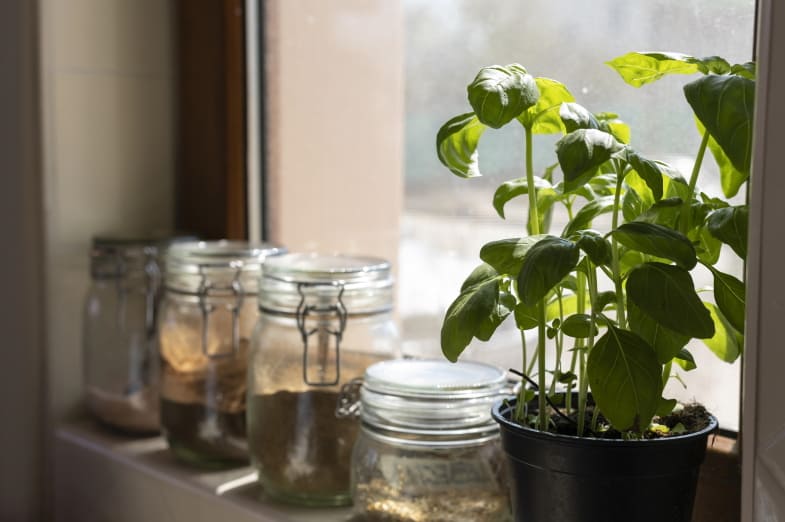
03
Repurpose and reuse
Reuse what you already have when you can. Use things for another purpose instead of throwing them away. Be creative with it! Give to someone else who would be happy to have them, the goods you don’t want anymore. Give them to a charity.
Buy second-hand. Not only you will save lots of money this way, but you can enjoy new experiences with friends such as clothes swap parties at Reuse Podgorica! There are many second-hand shops around Montenegro if you just look for them, or some online ones such as this second-hand shop.
Cool ideas
- Buy locally-made yoghurt in glass jars and reuse them to store your food in your kitchen or make your own preserves.
- Amend your old clothes with patches, and dye them with new colours.
- Find some second-hand mugs at the thrift store/market and organise a ceramic painting afternoon with your kids or friends.
- Reuse old pillowcases or curtains to sew grocery shopping bags for fruits and veggies and give some to your friends.
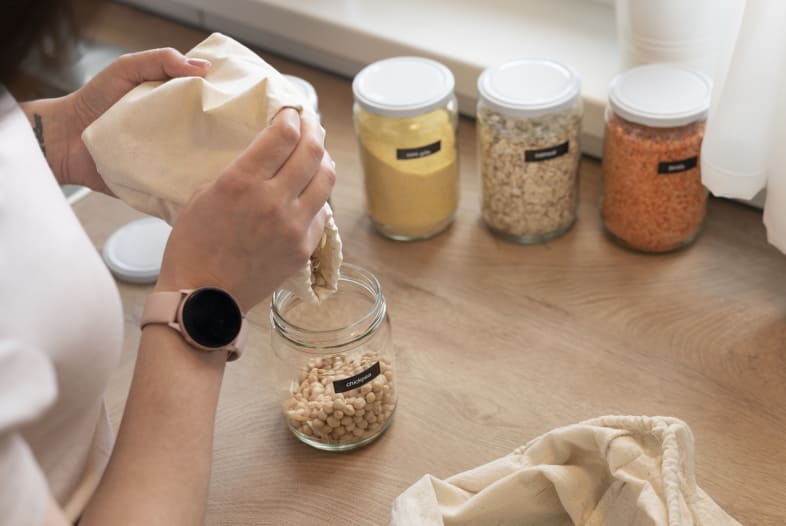
04
Recycle
Did you know that only 9% of the plastic ever produced still exists? And that in Montenegro, only about 1-2% of waste is recycled? Recycling is not a magic wand. Plastic needs to be collected, transported, sorted, washed, transported again, crushed, melted, transported, and transformed into a new product and it can only be recycled a few times. So the best is always to avoid producing single-use plastic waste and recycle the ones you just couldn’t avoid! Check out our map of recycling yards in Montenegro and find out which types of waste you can recycle there.
You can buy small recycling bins for your home to sort your waste at almost every homestore around or repurpose old cardboard boxes.
If you are living in Podgorica you can use the Kasper app by Cistoca to report waste in the territory of Podgorica or to be informed about recycling yards and locations of underground and aboveground containers. Download at App store or Google Play
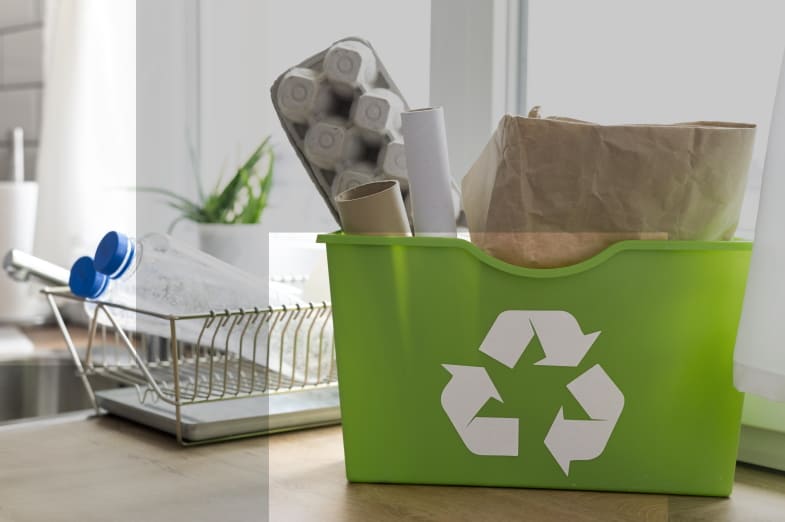
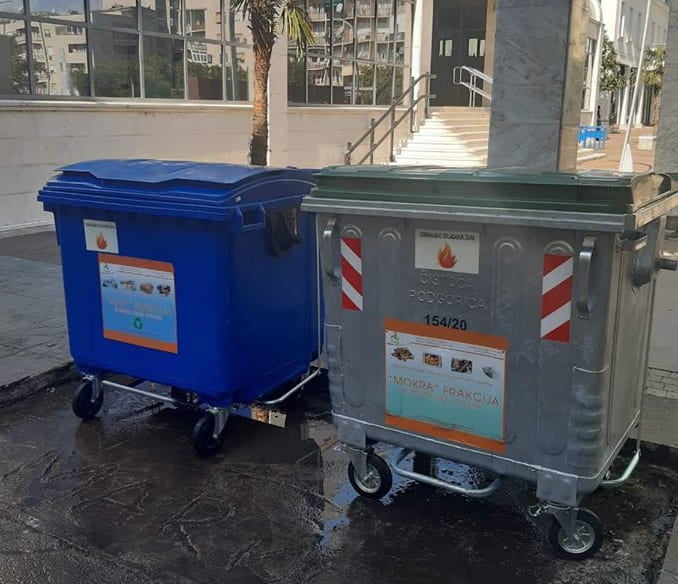
two-bin system
Did you know?
In 2018, The Ministry of Sustainable Development and Tourism accepted the two-bin system for separate waste collection of “dry” and “wet” fractions and sent consent for its implementation to local administrations and utility companies. The container for the “dry” fraction is intended for the disposal of paper, cardboard, plastic, metal and glass, while the container for the “wet” fraction is intended for the disposal of all the other types of municipal waste (waste that by its composition mostly wet due to the presence of food residues, organic waste, garden waste, hygiene products, etc.), not including bulky waste and edible oils and fats. We may argue whether this is the most efficient system for separating waste at source, but it can be a good start.
05
Rot
There are composting bins available at agro stores such as Agrarija, Agro Centar and Kalia, but you can easily make one yourself. Create a simple compost bin in your garden or on your balcony where you can put your organic waste and get free natural fertilizer for your plants.
Want to learn how to compost? Download our digital Composting brochure.
Did you know that worms can help you compost faster and that there is a worm farm in Podgorica?
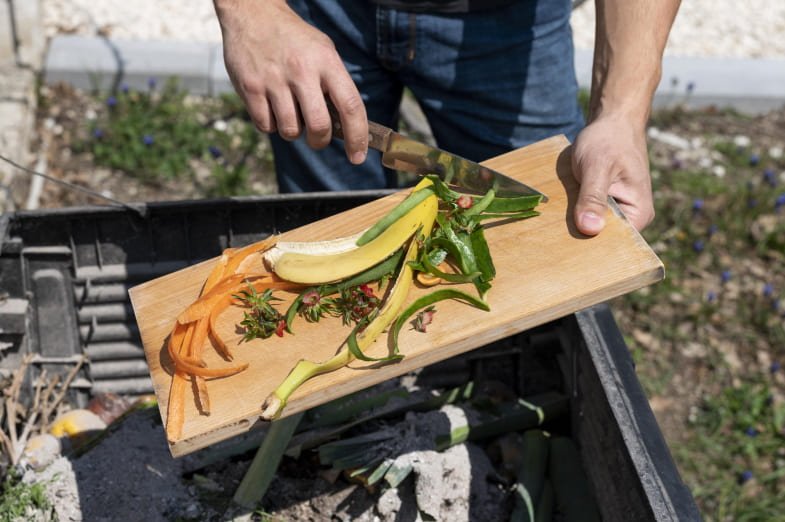
What else you can do?
Spread the word.
Talk to your friends and family about the issue of waste, let them know about the changes you made in your lifestyle and how they can start zero waste living, invite them to join clean-ups and other events.
Follow us on social media and become an online activist by sharing content about plastic pollution.
Register for our newsletter and we will send you newsletters, ask you to promote campaigns, sign petitions and join our events.
Join the community
Join us at the International coastal cleanup and take part in the brand audit
Become a long-term volunteer with us.
Demand decision-makers to implement zero-waste solutions in your community
Educate
Knowledge is power, become a ZW educator in your school or community, we have everything you need to get it started.
Support
Become a friend of Zero Waste Montenegro by donating monthly (starts at 1 € a month) and support our work.
